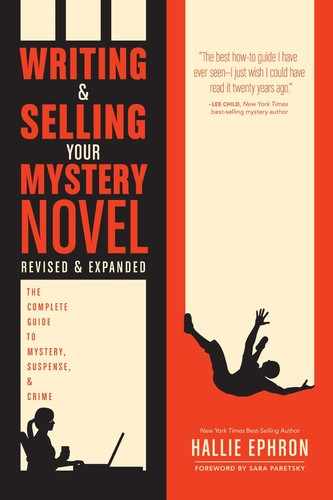Part IV
Publishing Your Mystery Novel
“Closely akin to the popular delusion … that the construction of the detective story is child’s play is an equally unfounded, general belief that the form is a literary gold mine, with financial rewards to the author out of all proportion to the amount of labor involved.”
—Howard Haycraft, Murder for Pleasure: The Life and Times of the Detective Story
And you thought writing the book was hard. Getting it into the hands of readers is another challenge that requires an entirely different skill set. Now you have to become knowledgeable about the publishing business and make shrewd decisions in support of your book and your writing career.
Over the last decade, publishing has been transformed by the rise of the e-book and the growth of Amazon, the online retailer that now dominates sales of print and digital books. The good news is that crime fiction is surviving the transition nicely, thank you very much. It sells well across all formats, so more publishers are getting in the game and launching new imprints.
One thing hasn’t changed: It is still brutally competitive to land a top-tier literary agent and a contract with a solid traditional publishing house. However, with self-publishing, authors no longer need traditional publishers to publish their books.
Traditional or self-publishing? If you’re not sure which path is best for you, think about what matters most to you. Prioritize this list, ranking the items from most important (1) to least (7).
___ A higher royalty rate
___ Control over the entire publishing process
___ Speed getting your book to market
___ Low expenses
___ Placement in bookstores
___ Availability in libraries
___ Reviews in trade publications and mainstream media
___ Becoming a New York Times best-selling author
The first four items on the list are benefits of self-publishing; the final four are benefits of traditional publishing.
If I were starting over in my career, I’d hedge my bets and pursue both options. I’d finish writing and revising my novel, and query literary agents while I started writing the next one. By the time my next novel was ready to go, I’d know whether traditional publishing had a place for me and whether it was the place I wanted to be.
Here are some terms you need to navigate the turf:
- Traditional publishers: Traditional publishers select the books they publish and contract with writers, often through literary agents. They pay all of the costs associated with bringing a book to market (editing, designing, printing, and distributing.) They pay the writer a royalty for each copy sold and sometimes an advance against that amount.
- Small independent publishers: Many small presses, referred to as “independent” because they are not part of larger corporations, publish anywhere from a handful to a couple of dozen books a year. Some follow a traditional publishing business model; others do not.
- Self-publishing (a.k.a. indie publishing): The author brings the book to market without going through a publisher. There is no selection process. The author decides which publishing services to use and performs or contracts out any services needed, like editing, cover design, and printing.
- Vanity press: A publisher that requires up-front payment by the author or a minimum purchase of copies.
- Digital publishing: The published book is an e-book, readable on a computer or e-reader like Kindle, NOOK, iPad, or Kobo. Traditional publishers, small presses, and self-published authors all have the option to digitally publish. Some mystery imprints are digital only.
- Print-on-demand (POD): POD technology enables copies of physical books to be printed from electronic files and bound on an as-needed basis. Authors can contract with services that print on demand, though many bookstores will not carry an author’s self-published POD books because generally they cannot be returned. Traditional publishers often use POD to keep print copies of backlist books available. Some brick-and-mortar bookstores have their own POD printer.
- Distribution channels: These are wholesalers that stock and sell print books and e-books. The largest print book distributors are Ingram and Baker & Taylor. They wholesale books to booksellers, libraries, and online retailers. Services that publish and distribute self-published e-books include Amazon Kindle Direct Publishing, Smashwords, and BookBaby.
- Literary agent: These are professionals who represent authors. They shop their authors’ manuscripts to prospective publishers and negotiate book deals on their authors’ behalves. They take a cut of the author’s earnings on the deals they negotiate, typically 15 percent (20 percent for subrights like foreign translations and film/TV).
- Query: A letter, often accompanied by a brief synopsis or opening chapter, that pitches a novel to an agent or editor. Most agents and editors want to see a query first, and if it piques their interest, they will request more. Some want to be queried by e-mail, others by snail mail. Typically they post instructions on how to query them on their websites.
- Unsolicited manuscripts: When a publisher says it won’t consider unsolicited manuscripts, it means it only considers manuscripts submitted by literary agents or by authors from whom one of their editors has requested the manuscript (for instance, from an author who has successfully pitched the book at a writing conference). When a literary agency says it won’t consider unsolicited manuscripts, it means it expects the author to submit a query first.
- Unagented submissions: When a publisher says it won’t consider unagented submissions, it means it will only respond to queries sent by literary agents.
- Advance and royalties: An advance is money a publisher pays a writer after signing the contract but before copies of the book are sold. A royalty is a payment the author receives as each book is sold. Advances must be earned out before additional money is paid to the author.
